The commission and platform fees charged to restaurants goes largely towards paying delivery riders a fair wage, says Grab Malaysia country head Sean Goh.
This follows complaints previously made by restaurateurs during the movement control order (MCO), where Grab Malaysia’s 30% commission on restaurants was noted as unfair, with associations such as Malaysian Muslim Restaurant Owners Association (PRESMA) calling for lower commissions to be charged.
However, Goh shared that the commission did not go to Grab Malaysia, but went back to the delivery riders instead.
“A huge part of the cost within the food delivery system is paying the riders. We need to compensate our delivery riders fairly, and the commissions charged go towards topping up the pay to the delivery riders,” said Goh.
He also explained that the commission becomes more noticeable when the reliance or contribution from the online platform increases, especially during the MCO, when the reliance was 100%.
“As it is, the food delivery business for us is loss-making, even before and during the MCO. With our riders being frontliners, we feel it is necessary to compensate them fairly.”
“It gets to the point where sometimes, the transaction itself becomes loss-making to make up the difference to the rider’s portion,” Goh told FocusM.
He also shared that, on average, the commission fee ranges from 25% to 30%, with the majority channelled back to supporting rider income.
“While there is an increase in demand for delivery services during restricted movements, our cost to sustain and protect our delivery network has also increased in view of stringent health and hygiene measures required,” said Goh, adding that the focus was to drive demand for the benefit of both the merchants and the riders.
Goh also noted that Grab Malaysia took the decision to help smaller players, making it a matter of prioritisation towards helping those who were struggling the most, which would leave some businesses feeling left out.
“If we were really being unfair, we know we would not have a strong position for long, so we need to be fair to both the riders and the merchants.”
“We also tried to help merchants in a way that was sustainable. We also offered a means of facilitating payments for free by introducing zero commissions for self-pickup orders, not through the app, but through customised GrabPay links. We also absorbed all related transaction fees for orders received via social platforms,” said Goh.
He further explained that this then placed the onus of control on the merchants, where they can seek their own sales as well.
A rebate of RM3,000 per merchant was also offered to small-to-medium restaurants, in the form of a RM3 rebate per order received.
This tied back to how commissions were used to pay the riders, as no merchant commissions meant Grab cannot afford to top up the fee to riders and drivers, leading to the decision of a rebate.
Goh also shared that there was a recent revamp of the delivery fee structure, which aimed to provide users with greater value for their orders, while encouraging more orders for smaller and independent restaurants.
This included lower delivery charges on the customer, with the remainder subsidised by Grab Malaysia so the riders’ income remains unaffected, as well as packages where users can purchase discount vouchers.
“With food delivery services quickly becoming an integrated part of our lives, we are continuously working to continue expanding our service not only to cater to customers’ needs but also to help create further opportunities for businesses and gig workers to grow, and strike a balance to sustain the industry,” said Goh.
Grab had taken a major hit over the MCO, according to Goh, who noted that ride hailing, as the backbone of the company, saw a 90% drop over the MCO.
“Even now, the levels of passengers are not back to where it used to be,” said Goh.
Moving forward, Goh noted that the company will continue to try to drive more demand and launch new services, trading a higher volume for a lower margin, and to create more tools to help merchants help themselves to recover from the effects of the MCO.










